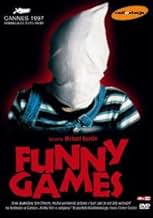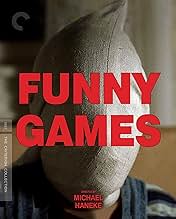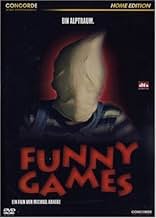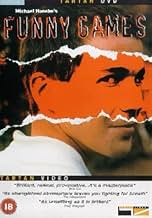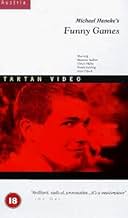Deux jeunes hommes violents prennent une famille en otage dans leur chalet de vacances et les force à jouer à des "jeux" sadiques entre eux pour se divertir.Deux jeunes hommes violents prennent une famille en otage dans leur chalet de vacances et les force à jouer à des "jeux" sadiques entre eux pour se divertir.Deux jeunes hommes violents prennent une famille en otage dans leur chalet de vacances et les force à jouer à des "jeux" sadiques entre eux pour se divertir.
- Prix
- 5 victoires et 9 nominations au total
Avis en vedette
I watched this year's remake of "Funny Games" prior to the original, simply because its sick-with-irony trailer got me extremely curious. Granted, this goes against my usual process of viewing a remake's precursor prior to the remake itself, but I couldn't help myself. By the end, I was astonished by writer-director Michael Haneke's audacity in telling a macabre home-invasion story devoid of Hollywood glamour, humor, and mercyremake or no, it's still one of the ballsiest exercises in visceral, reality-based horror ever released by a major studio.
So, when I decided to give the original "Funny Games" a spin (mere days after my viewing of American version), I was filled with presupposition toward how much I would appreciate the original (with the twists of Haneke's shot-for-shot remake still mapped out in my mind)similar to a sadistic "bet" our captors make with their prey, I was wondering if this earlier, German-language version would survive on its own terms. And, while each version is practically identical (save for some subtle nuances in the performances, the slightly varied location design, andof coursethe spoken language), both quite miraculously carry the same visceral, jaw-dropping sucker-punches as the other. Unlike the much-derided American remakes of "The Vanishing" and "Les Diaboliques," Haneke sees no need to let either culture off the hook, especially when each has its own prominent history of violence, on- and off-camera.
Ironically, the references to metalhead couch potatoes Beavis and Butt-Head probably seemed like an incendiary bitch-slap to the passive glamorization of American filmed violence in the 1997 version, but there is an even stronger sense of irony when the MTV-hosted duo are referenced in the remakeon the shores that birthed them, and the cult following of Generation Y-ers that has accumulated in the years since the show's cancellation (a sure sign that our passivity, if anything, is more pronounced now). It's subtle observations like this that give both versions of "Funny Games" an added resonance.
If anything takes some getting used to in the 1997 film, it's the general unfamiliarity of the cast. After seeing a collection of familiar performers run through Haneke's horrifying 2008 experiment, the German cast begins with a studied approach to the performances that eventually loosens into hysteria and desperation that is just as convincing as their remake counterparts. It is truly stunning how Haneke mines the same static framing and intense performances to ends that are equally effective in both films (even knowing the outcome of a protracted long take following a pivotal off-screen event, I found the experience just as emotionally agonizing to witness).
While it may seem hypocritical to "side" with Haneke (at least in the context his film creates), especially when I patronize (and am prone to enjoying) films that frequently downplay the reality of human suffering, the effect in both versions of "Funny Games" is undeniably powerfulthese are difficult, ugly, and emotionally draining films crafted with undeniable (and remarkably subtle) purpose. If there's any catharsis to be had from them, it will be in the introspection and assessment of your own attitudes toward violence.
So, when I decided to give the original "Funny Games" a spin (mere days after my viewing of American version), I was filled with presupposition toward how much I would appreciate the original (with the twists of Haneke's shot-for-shot remake still mapped out in my mind)similar to a sadistic "bet" our captors make with their prey, I was wondering if this earlier, German-language version would survive on its own terms. And, while each version is practically identical (save for some subtle nuances in the performances, the slightly varied location design, andof coursethe spoken language), both quite miraculously carry the same visceral, jaw-dropping sucker-punches as the other. Unlike the much-derided American remakes of "The Vanishing" and "Les Diaboliques," Haneke sees no need to let either culture off the hook, especially when each has its own prominent history of violence, on- and off-camera.
Ironically, the references to metalhead couch potatoes Beavis and Butt-Head probably seemed like an incendiary bitch-slap to the passive glamorization of American filmed violence in the 1997 version, but there is an even stronger sense of irony when the MTV-hosted duo are referenced in the remakeon the shores that birthed them, and the cult following of Generation Y-ers that has accumulated in the years since the show's cancellation (a sure sign that our passivity, if anything, is more pronounced now). It's subtle observations like this that give both versions of "Funny Games" an added resonance.
If anything takes some getting used to in the 1997 film, it's the general unfamiliarity of the cast. After seeing a collection of familiar performers run through Haneke's horrifying 2008 experiment, the German cast begins with a studied approach to the performances that eventually loosens into hysteria and desperation that is just as convincing as their remake counterparts. It is truly stunning how Haneke mines the same static framing and intense performances to ends that are equally effective in both films (even knowing the outcome of a protracted long take following a pivotal off-screen event, I found the experience just as emotionally agonizing to witness).
While it may seem hypocritical to "side" with Haneke (at least in the context his film creates), especially when I patronize (and am prone to enjoying) films that frequently downplay the reality of human suffering, the effect in both versions of "Funny Games" is undeniably powerfulthese are difficult, ugly, and emotionally draining films crafted with undeniable (and remarkably subtle) purpose. If there's any catharsis to be had from them, it will be in the introspection and assessment of your own attitudes toward violence.
First things first, Michael Haneke HATES Quentin Tarantino's films. He hates the way violence and death are shown as being 'cool' - Cool gangsters executing their enemies whilst saying cool lines (And you will know, that my name is the Lord! etc,etc)with a cool song playing in the background. This is not how violence is in the real world, violence is a horrible fact of life, not a glamourous thing for youths to copy, and I think Haneke intended Funny Games to show it how it really is. I watched Funny Games without the slightest clue what the film was about, so I just had to sit back and take it as it comes. At first, I wasn't too impressed. I thought the scenes were too long and dragged out, yet at the same time, I felt a strange feeling of suspense. The incredibly long camera shots leave you that bored, that you think "Something bad is going to happen soon, I can tell...". The suspense also lasts right through the film 'til the very end. You don't want to watch it, but at the same time, you feel hypnotised by it.
I will not detail any events of the film, to save spoiling the atmosphere, but I will note one thing that people tend to be confused about:- "Why did the family let them into the house in the first place?" The two characters of Peter and Paul are let to walk all over the family because of one flaw in the bourgios psyche - 'The more polite a person is, the better a person they are.' This absurd way of thinking is played on by Peter and Paul and they obviously score, plus 'getting into the house without breaking in' is also one of their 'games'.For those who haven't seen the film, I definitely wouldn't recommend this for a night in with the parents/girlfriend, but I definitely would for people who want to see the difference between death and Tarantino-glam. Prepare for a highly suspenseful yet sickeningly violent, non-Hollywood, edge-of-the-seat piece of art. 8/10
I will not detail any events of the film, to save spoiling the atmosphere, but I will note one thing that people tend to be confused about:- "Why did the family let them into the house in the first place?" The two characters of Peter and Paul are let to walk all over the family because of one flaw in the bourgios psyche - 'The more polite a person is, the better a person they are.' This absurd way of thinking is played on by Peter and Paul and they obviously score, plus 'getting into the house without breaking in' is also one of their 'games'.For those who haven't seen the film, I definitely wouldn't recommend this for a night in with the parents/girlfriend, but I definitely would for people who want to see the difference between death and Tarantino-glam. Prepare for a highly suspenseful yet sickeningly violent, non-Hollywood, edge-of-the-seat piece of art. 8/10
I don't know what to rate this. Although I can appreciate what Haneke was going for, the morally condescending tone didn't work for me. While you could write a book on the topic, I'll keep my thoughts short: humans have a fundamental craving for violence, and I can differentiate violence in media from violence in reality. His message just ended up falling flat. There wasn't any deeper criticism of violence and I didn't walk away feeling wrong or like I should have a new perspective on the matter. Yet I still didn't dislike it... The film was expertly crafted for his intentions, was adeptly acted, and I was kept engaged. Does that make me his target? Is it just pretentiousness? I'm not sure.
6.4/10
6.4/10
10Flador
SPOILER: Okay... I just read most of the 144 user reviews.... Basically I wanted to make up my mind about this film, a film that is a very heavy load.
I've seen this movie 5 years ago, the good thing is most of the time you forget about (having seen) it but now and then you recall it. I can understand that many people hate this film, it is not nice to watch, the more when you see it in a theatre where the only chance to break its spell is leaving the theatre. Regardless if you leave or stay and watch it leave it beats you one way or the other. I fully agree with many other reviewers that I have no idea whom I should recommend it too. I am tempted to watch it a second time but didn't make it happen in 5 years.
Don't get me wrong. I think it is an excellent movie. It is also very disturbing and upsetting, I can't think of the right mood to watch it cause it'll take you down. And I think here is where the movie polarises. If, after watching, you find yourself deducting some message in the violence, and perhaps rethink violence - in both real life and movies - you will, well, also will have found some reason for this movies existence, if not - and it might be better if one does not - you will join in the 'crappiest movie ever chorus'.
I do however want to point out some achievement of this production:
*) The movie catches the audience in theatre. *) It does shock the audience but most of the violence is off-screen. You see more people dying in many fast-driven action movies. Only here you care. There is minor suspense, but I, personally, wouldn't put it into that category. (But then I am no horror/shocker/suspense fan and can easily err here) *) It's hard to compare it with any other movie (that I have seen). I am not sure if this is an achievement, but it's outstanding.
The reason I think Haneke made this movie. or, what I deducted from it is how far away violence and death are in our everyday lives today. While Hollywood - and other film productions serve them daily right in our living room, we hardly notice them anymore. Violence also sells movies, and we're meanwhile pretty used to that. Haneke also serves violence, and he dishes it next-door. He turns into a moral figure that asks the audience if they want more (after all me and you consume it every day) - and while HERE we want to say 'no please stop' he doesn't do our silent bidding. He pushes us down the drain, forcing us to deal with aspects of the violence we don't (want to) see. He even goes one step further. He offers us a 'good' ending, a payback that would make it easier for us to bear the movie, only to snatch it back and rip us of any cheerful emotion, telling us like 'no, sorry, here it doesn't work that way'.
I also read reviews mentioning the unsatisfying (often used, cliche) end. One more time Haneke manages to disappoint us, so far we were driven and didn't know what would happen, what to expect.
Only in the ending, we see it coming, and so it ends, obviously similar to many other movies. We're back standard movie stuff, the arc bent and the connection made.
"Funny games" is everything else but the title. Perhaps it refers to the funny games built on standard film violence in everyday movies. Perhaps it doesn't. Perhaps Haneke wants to stress that violence is a bad thing. Perhaps he's just sick.
One thing for sure, regardless if you like it, don't care, or hate it. You might have seen something somewhat like it, but nothing similar.
If you hate shockers, don't watch it. It will only be torture. If you love suspense, sorry, only very little gore here.
If you plan to watch it, calculate a few hours before you will manage to put your head to rest.
And don't watch it it personal crisis.
This movie will make you feel bad. If you watch it in a cinema, just look around. You're not alone with this feeling.
I've seen this movie 5 years ago, the good thing is most of the time you forget about (having seen) it but now and then you recall it. I can understand that many people hate this film, it is not nice to watch, the more when you see it in a theatre where the only chance to break its spell is leaving the theatre. Regardless if you leave or stay and watch it leave it beats you one way or the other. I fully agree with many other reviewers that I have no idea whom I should recommend it too. I am tempted to watch it a second time but didn't make it happen in 5 years.
Don't get me wrong. I think it is an excellent movie. It is also very disturbing and upsetting, I can't think of the right mood to watch it cause it'll take you down. And I think here is where the movie polarises. If, after watching, you find yourself deducting some message in the violence, and perhaps rethink violence - in both real life and movies - you will, well, also will have found some reason for this movies existence, if not - and it might be better if one does not - you will join in the 'crappiest movie ever chorus'.
I do however want to point out some achievement of this production:
*) The movie catches the audience in theatre. *) It does shock the audience but most of the violence is off-screen. You see more people dying in many fast-driven action movies. Only here you care. There is minor suspense, but I, personally, wouldn't put it into that category. (But then I am no horror/shocker/suspense fan and can easily err here) *) It's hard to compare it with any other movie (that I have seen). I am not sure if this is an achievement, but it's outstanding.
The reason I think Haneke made this movie. or, what I deducted from it is how far away violence and death are in our everyday lives today. While Hollywood - and other film productions serve them daily right in our living room, we hardly notice them anymore. Violence also sells movies, and we're meanwhile pretty used to that. Haneke also serves violence, and he dishes it next-door. He turns into a moral figure that asks the audience if they want more (after all me and you consume it every day) - and while HERE we want to say 'no please stop' he doesn't do our silent bidding. He pushes us down the drain, forcing us to deal with aspects of the violence we don't (want to) see. He even goes one step further. He offers us a 'good' ending, a payback that would make it easier for us to bear the movie, only to snatch it back and rip us of any cheerful emotion, telling us like 'no, sorry, here it doesn't work that way'.
I also read reviews mentioning the unsatisfying (often used, cliche) end. One more time Haneke manages to disappoint us, so far we were driven and didn't know what would happen, what to expect.
Only in the ending, we see it coming, and so it ends, obviously similar to many other movies. We're back standard movie stuff, the arc bent and the connection made.
"Funny games" is everything else but the title. Perhaps it refers to the funny games built on standard film violence in everyday movies. Perhaps it doesn't. Perhaps Haneke wants to stress that violence is a bad thing. Perhaps he's just sick.
One thing for sure, regardless if you like it, don't care, or hate it. You might have seen something somewhat like it, but nothing similar.
If you hate shockers, don't watch it. It will only be torture. If you love suspense, sorry, only very little gore here.
If you plan to watch it, calculate a few hours before you will manage to put your head to rest.
And don't watch it it personal crisis.
This movie will make you feel bad. If you watch it in a cinema, just look around. You're not alone with this feeling.
In this cross between Who's Afraid Of Virginia Woolf and A Clockwork Orange, two insolent young psychopaths torment a vacationing family.
It was hard to organize my thoughts on this movie, never mind rating it. As a thriller, this is a tense, well-acted, and relentless experience, marred only by a contrived sequence two-thirds through in which characters behave in unbelievably stupid fashion. However, said sequence is preceded by an incredibly effective ten-minute take. Unusually lengthy takes are often deemed self-indulgent, but this one is anything but.
As an ideological statement, though, this film is a failure. And there is no doubt that writer-director Michael Haneke is trying to make a statement. By having one of the psychos address the camera a few times, saying things to the effect that they have to give the viewers their money's worth, Haneke is essentially wagging his finger at anyone who has ever enjoyed the portrayal of violence in a film. This theme is certainly open to debate, but the problem is that Haneke expresses it in such a condescending way. His harrowing treatment of violence already serves as an excellent counterpoint to other films that glamorize it. There was no need to then leave viewers feeling as though they'd just been lectured by a stern parent.
The last time a filmmaker made me angry, it was when I saw Independence Day, and it was for the same reason. In both cases, the writer and the director display contempt by assuming their audiences are idiots. My anger didn't really ignite, though, until I watched a short interview with Haneke on the DVD. It made me never want to see another one of his films. The man is disgustingly full of himself.
So why the relatively high rating? Because as pretentious and self-important as Haneke is, he is also very talented. The movie is very effective on an emotional level, and it's possible to watch it while ignoring the director's wrong-headed decisions.
It was hard to organize my thoughts on this movie, never mind rating it. As a thriller, this is a tense, well-acted, and relentless experience, marred only by a contrived sequence two-thirds through in which characters behave in unbelievably stupid fashion. However, said sequence is preceded by an incredibly effective ten-minute take. Unusually lengthy takes are often deemed self-indulgent, but this one is anything but.
As an ideological statement, though, this film is a failure. And there is no doubt that writer-director Michael Haneke is trying to make a statement. By having one of the psychos address the camera a few times, saying things to the effect that they have to give the viewers their money's worth, Haneke is essentially wagging his finger at anyone who has ever enjoyed the portrayal of violence in a film. This theme is certainly open to debate, but the problem is that Haneke expresses it in such a condescending way. His harrowing treatment of violence already serves as an excellent counterpoint to other films that glamorize it. There was no need to then leave viewers feeling as though they'd just been lectured by a stern parent.
The last time a filmmaker made me angry, it was when I saw Independence Day, and it was for the same reason. In both cases, the writer and the director display contempt by assuming their audiences are idiots. My anger didn't really ignite, though, until I watched a short interview with Haneke on the DVD. It made me never want to see another one of his films. The man is disgustingly full of himself.
So why the relatively high rating? Because as pretentious and self-important as Haneke is, he is also very talented. The movie is very effective on an emotional level, and it's possible to watch it while ignoring the director's wrong-headed decisions.
Le saviez-vous
- AnecdotesUlrich Mühe and Susanne Lothar, who play the father and mother, were a couple in real life from this movie until Mühe's death in 2007.
- GaffesWhen Anna and Georg are driving in their car, the reflection of a microphone between the front seats can be seen on the window.
- Générique farfeluThe front credits list "music by" several classical composers and John Zorn. Given the director's outspoken views on modern media, including the "composer" of the hardcore "thrash metal" songs alongside the likes of Handel and Mozart is part of his message.
- ConnexionsFeatured in The Last Days of the Board (1999)
- Bandes originalesCara Salva
from 'Atalanta'
Music by George Frideric Handel (as G.F. Händel)
Sung by Beniamino Gigli
Published by EMI DA 1918
Meilleurs choix
Connectez-vous pour évaluer et surveiller les recommandations personnalisées
Détails
- Date de sortie
- Pays d’origine
- Site officiel
- Langues
- Aussi connu sous le nom de
- Juegos divertidos
- Lieux de tournage
- sociétés de production
- Consultez plus de crédits d'entreprise sur IMDbPro
Box-office
- Brut – à l'échelle mondiale
- 1 266 $ US
- Durée1 heure 48 minutes
- Couleur
- Mixage
- Rapport de forme
- 1.85 : 1
Contribuer à cette page
Suggérer une modification ou ajouter du contenu manquant


